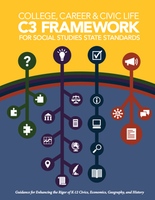After three years of work,
The College, Career, and Civic Life (C3) Framework for Social Studies State Standards was published last fall. The C3 Framework is available at no cost on the
NCSS website, and for purchase in print.
 The College, Career, and Civic Life (C3) Framework for Social Studies State Standards
The College, Career, and Civic Life (C3) Framework for Social Studies State Standards was conceptualized by individual state leaders in social studies education and supported by 15 professional organizations representing four core social studies content areas: civics, economics, geography, and history. The C3 Framework was written by experts in the academic disciplines and social studies education in collaboration with classroom teachers, state social studies education leaders, and professional organization representatives.
Work on the C3 Framework began in 2010 with the development of an initial conceptual guidance document written by individuals from the Council of Chief State School Officers (CCSSO) Social Studies Assessment, Curriculum and Instruction state collaborative and representatives from the professional associations. The framework writers were selected in consultation with the participating professional associations. Feedback was solicited throughout the process from stakeholders, including invitational reviews with professional organizations, teachers, and critical friends.
The primary purpose of the C3 Framework for Social Studies State Standards is to provide guidance to states and districts on the concepts, skills and disciplinary tools necessary to prepare students for college, career, and civic life. In doing so, the C3 Framework offers guidance and support for rigorous student learning. That guidance and support takes form in an inquiry arcundefineda set of interlocking and mutually reinforcing ideas that feature the four Dimensions of informed inquiry in social studies: (1) developing questions and planning inquiries; (2) applying disciplinary concepts and tools; (3) evaluating sources and using evidence; and (4) communicating conclusions and taking informed action.